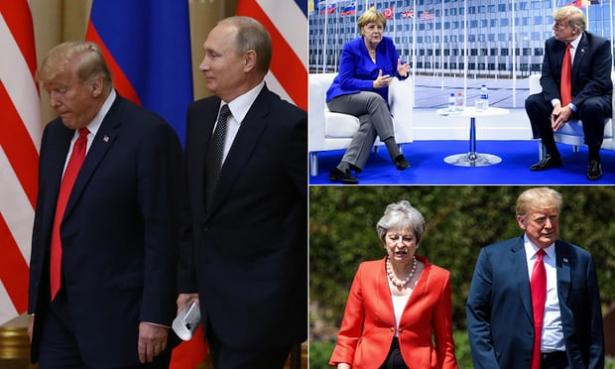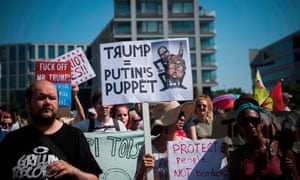The contrast presented by Donald Trump and Vladimir Putin at their Helsinki press conference was striking. One should not judge a president by appearances, but in this case the comparison was instructive. Putin, immaculate in a beautifully tailored dark blue suit, looked sharp, cool and in control. Trump looked baggy, crumpled and out of his depth – at once baffled and sulky. This mismatch was the equivalent, in post-World Cup terms, of France v Corinthian-Casuals.
Trump was outshone, outmanoeuvred, out-thought and outwitted. Here was no Rocky Balboa, champion of the common man, running up the steps of Philadelphia’s Museum of Art: more a New York version of the ignorant, bigoted Alf Garnett, stumbling glass-jawed into a disastrous public drubbing. Trump had it coming, of course. He has been winging it ever since he took office 18 months ago. To go into a summit of such significance without preparation was the height of folly and vanity.
It was Anthony Lake, Bill Clinton’s national security adviser, who reputedly coined the term “rogue state” to describe countries the US regards as threatening international security. Ronald Reagan preferred “outlaw states”; under George W Bush, these supposed enemies became “states of concern”. But no American administration has yet come up with a term for an outlaw president – let alone a plan to deal with one.
On his European tour that began last week at Nato in Brussels, which careered through England and Scotland, and ended with a dull, sickening thud in Helsinki, Trump went rogue. He proved himself, beyond all reasonable doubt, to be a one-man threat to international peace and security, a menace to America’s friends and a rare tonic for its enemies. Judging by the furore that followed Putin’s knockout victory, nobody in Washington has a clue what to do about it.
Apologists point to Trump’s “America first” rhetoric to explain and connect his outlook and actions. This is not a new slogan, carrying as it does unedifying echoes of ultra-nationalistic, isolationist episodes in past American life. Even so, Trump does not follow his own advice. In his attacks on the EU and Nato, in his wildly unscripted assault on Theresa May, and again in his display of craven deference towards Putin, Trump put himself first and America last.
‘In his display of craven deference towards Putin, Trump put himself first and America last.’ Photograph: Jonathan Nackstrand/AFP/Getty Images
Admirers call him an anti-establishment “disrupter-in-chief”, when in reality the overriding, relentless purpose of his actions is to draw maximum attention to himself. Trump only knows what he does not like and wants to destroy. For example, he does not like strong and experienced democratically elected leaders such as Germany’s Angela Merkel because, in his infinite insecurity, they threaten his sense of pre-eminence and legitimacy.
Trump’s visceral reaction to perceived weakness, like his obsessive worries about contact with germs, seems to be the product of fear that a similar fallibility may infect him, too. And according to psychologists who treat narcissism as a mental disorder, it is fear, more than its other features – shamelessness, arrogance, self-centredness, lack of trust and a chronic need for validation – that is the primary emotion dominating and dictating the narcissist’s life and conduct.
Looking more closely at Trump’s performance on the Helsinki podium, it appears, deep down, he was frightened: frightened of making mistakes, of being “ripped off”, of being exposed as a charlatan, and of being proved to have stolen the 2016 election. For him the summit was not about Syria, or Crimea or Salisbury (though these subjects were discussed and who knows what he may have privately conceded). It all was about his personal standing at home, in the world, and in his own eyes. America came last.
How to handle this rogue president? A gloating Putin will seek to exploit his advantage, in overt and covert ways. Nato and the EU should worry – although, as in other “negotiations”, Trump’s verbal assaults were quickly followed by conciliatory noises. Likewise, having first savaged May over Brexit, Trump backed off. This is the typical cowardly behaviour of a fearful, insecure bully. Trump’s UK visit gave everybody a close-up glimpse of awfulness personified. There will be fewer illusions now, especially over prospects for an equitable US trade deal.
The real Trump problem is not transatlantic. It is America’s to deal with. By now, Europeans have mostly rumbled him. But far too many Americans still don’t get it. Having long proclaimed the superiority of the US governance model, it transpires Congress is unable or unwilling to hold him in check. The unbalanced supreme court, soon to embrace another arch-conservative, is no defence against White House abuse of executive orders, and parti pris American media cannot be relied upon to tell truth to power. Rogue Trump is a crisis made in America. America is where it must be fixed. The world is watching, with diminishing sympathy.
• Simon Tisdall is a foreign affairs commentator



Spread the word